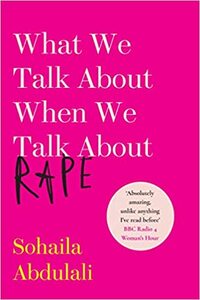Take a photo of a barcode or cover
Conversational, fast read with perspective. Answers/dispells dumb questions and asks smart ones.
challenging
emotional
hopeful
informative
inspiring
medium-paced
Sohaila Abdulali has written a book that is incredibly honest, incredibly intimate, and effortlessly authoritative. the voice of the book is analyzing where we are at in our fight against rape culture, and in the same breath, we see all the ways that humanity got us here. despite all the truth that Abdulali lays out for us, we are not left without hope.
Graphic: Child abuse, Death, Domestic abuse, Emotional abuse, Misogyny, Physical abuse, Rape, Sexual assault, Sexual content, Sexual violence, Toxic relationship, Violence, Trafficking, Murder
Feminism is all about empowering women. And this book does exactly that; it asks difficult questions, it delves deep into a subject that is wrongly, in my opinion, considered taboo, it promotes both empathy and critical thinking. This book may not be a memoir or an academic piece, it is however carefully and precisely researched. Abdulali has an important voice that needs to be heard.
This copy was kindly provided to me by the publisher via NetGalley.
This copy was kindly provided to me by the publisher via NetGalley.
challenging
dark
informative
sad
medium-paced
challenging
emotional
informative
inspiring
reflective
sad
medium-paced
Representation:
- The author describes herself as: “A brown bisexual middle-aged atheist Muslim survivor immigrant writer without a Shame Gene.”
- Discusses the r*pe culture of India (as well as many other non-Western countries)
Note: The censored r*pe is used to break up the word as the complete word can be triggering for some survivors. However, I will not be using the censor for the rest of my review as the title of the book does not censor the word.
Read my full review on my blog:
Talk Nerdy Book Blog | What We Talk About When We Talk about Rape Review
Follow Me
Blog • Instagram • Goodreads • Facebook • BlogLovin'
Possible Triggers: Yes
• Discussion of rape culture
• Discussion and description of Rape including,
– Gang rape
– Child rape
– Marital rape
– Casual rape (Perpetrator wants sex)
– Damage rape (Perpetrator wants to cause pain)
• Child brides
• Suicide
• Violence
What We Talk About When We Talk About Rape is the most important and powerful book I’ve read this year and probably in my entire life. Rape is such a hard topic to talk about. Its causes are embedded in cultural traditions that are rooted in sexism, racism and classism. Yet, rape is also rationalized and excused by the people and institutions that should be the protectors of victims and survivors of rape.
I highly recommend reading this book if you are interested in understanding the nuances and complexity of rape and consent and why and how society has been conditioned to—as a first response—blame the victim and survivor of rape rather than the rapist.
The book is also an empathetic resource for understanding why some survivors are unable to speak up.
Mature Themes:
• Sex work
• Alcohol and drug abuse
• BDSM
• See Possible Triggers for Abuse and OTT sad parts.
Ending:Non-fiction... Powerful
- The author describes herself as: “A brown bisexual middle-aged atheist Muslim survivor immigrant writer without a Shame Gene.”
- Discusses the r*pe culture of India (as well as many other non-Western countries)
Note: The censored r*pe is used to break up the word as the complete word can be triggering for some survivors. However, I will not be using the censor for the rest of my review as the title of the book does not censor the word.
Read my full review on my blog:
Talk Nerdy Book Blog | What We Talk About When We Talk about Rape Review
Follow Me
Blog • Instagram • Goodreads • Facebook • BlogLovin'
Possible Triggers: Yes
• Discussion of rape culture
• Discussion and description of Rape including,
– Gang rape
– Child rape
– Marital rape
– Casual rape (Perpetrator wants sex)
– Damage rape (Perpetrator wants to cause pain)
• Child brides
• Suicide
• Violence
What We Talk About When We Talk About Rape is the most important and powerful book I’ve read this year and probably in my entire life. Rape is such a hard topic to talk about. Its causes are embedded in cultural traditions that are rooted in sexism, racism and classism. Yet, rape is also rationalized and excused by the people and institutions that should be the protectors of victims and survivors of rape.
I highly recommend reading this book if you are interested in understanding the nuances and complexity of rape and consent and why and how society has been conditioned to—as a first response—blame the victim and survivor of rape rather than the rapist.
The book is also an empathetic resource for understanding why some survivors are unable to speak up.
Mature Themes:
• Sex work
• Alcohol and drug abuse
• BDSM
• See Possible Triggers for Abuse and OTT sad parts.
Ending:
challenging
dark
emotional
hopeful
informative
inspiring
reflective
sad
tense
medium-paced
"No matter what happened, here I am."
This book explores the nuances and impacts of how different societies around the world speak about rape in public discourse. Parts were difficult to get through (at one point I had to put it aside for a few weeks), not because they were poorly written, but because the content was, by its very nature, triggering at points. That being said, I am very glad I got through it. It was scathing, heartbreaking, and hopeful all at once. Changing the culture surrounding rape is crucial to reducing or, if you're a "mad dreamer" like Abdulali, eliminating it. Anyone who feels able to do so should read this book.
This book explores the nuances and impacts of how different societies around the world speak about rape in public discourse. Parts were difficult to get through (at one point I had to put it aside for a few weeks), not because they were poorly written, but because the content was, by its very nature, triggering at points. That being said, I am very glad I got through it. It was scathing, heartbreaking, and hopeful all at once. Changing the culture surrounding rape is crucial to reducing or, if you're a "mad dreamer" like Abdulali, eliminating it. Anyone who feels able to do so should read this book.
Graphic: Rape, Sexual assault, Sexual violence
I received a digital copy of this book from NetGalley in exchange for an honest review.
This is such an important book. If I had to put into words, I'd say this book is the conversation about rape that I wish someone older and more mature had had with me or I could have with someone .younger. The good thing is, now we can. Through this memoir-slash-self help manual, Sohaila Abdulali, a rape survivor and head of a rape crisis center, shows us just how frankly we can talk about sexual assault without coming across as brash or insensitive. It doesn't seem like an easy conversation. But Abdulali comes from an Indian Muslim family, two of the most 'conservative' dynamics a family could possibly possess and yet she states her parents used to print out her writing regarding her experience and hand it out to stunned guests to read. If that's not your cup of tea, you can just sit at a dinner table with your family or friends and start by saying, "I just read a great book titled "What We Talk About When We Talk About Rape" & I feel that everyone should read it!" Talk about an ice breaker.
Apart from sharing her own experience, the author uses incidences from around the world as well as the research of many experts to talk about the importance of sexual education, creating awareness regarding consent among both sexes (and especially among children, because let's face it they are exposed to so much in today's technology, teaching them something significant that could protect them or those close to them can hardly be considered too sensitive for their age) and the importance of the #MeToo movement and how it helped spur not only a nationwide but a global conversation about an issue that has been brushed under the rug for far too long.
I would recommend this book to everyone that I possibly can in the hopes that it will encourage them to start talking more openly regarding the taboo of rape. Because once we talk about it, it is real and thus harder to ignore. Which is what we need as a species now more than ever.
Rating: 5/5
This is such an important book. If I had to put into words, I'd say this book is the conversation about rape that I wish someone older and more mature had had with me or I could have with someone .younger. The good thing is, now we can. Through this memoir-slash-self help manual, Sohaila Abdulali, a rape survivor and head of a rape crisis center, shows us just how frankly we can talk about sexual assault without coming across as brash or insensitive. It doesn't seem like an easy conversation. But Abdulali comes from an Indian Muslim family, two of the most 'conservative' dynamics a family could possibly possess and yet she states her parents used to print out her writing regarding her experience and hand it out to stunned guests to read. If that's not your cup of tea, you can just sit at a dinner table with your family or friends and start by saying, "I just read a great book titled "What We Talk About When We Talk About Rape" & I feel that everyone should read it!" Talk about an ice breaker.
Apart from sharing her own experience, the author uses incidences from around the world as well as the research of many experts to talk about the importance of sexual education, creating awareness regarding consent among both sexes (and especially among children, because let's face it they are exposed to so much in today's technology, teaching them something significant that could protect them or those close to them can hardly be considered too sensitive for their age) and the importance of the #MeToo movement and how it helped spur not only a nationwide but a global conversation about an issue that has been brushed under the rug for far too long.
I would recommend this book to everyone that I possibly can in the hopes that it will encourage them to start talking more openly regarding the taboo of rape. Because once we talk about it, it is real and thus harder to ignore. Which is what we need as a species now more than ever.
Rating: 5/5
What We Talk When We Talk About Rape - #bookrecommendation
~
Where do I begin? Regardless of how others found this book, it had a significant impact on my mind. We see about a thousand rape cases being displayed on the news channels every day but hardly give it a second thought. Because it's all so common. Rape is just another crime that happens without us having to pay it much attention. I haven't met any rape survivors and for that reason this book proved to be extraordinary. Sohaila is a rape survivor herself and who better to address this issue than the woman with the firmest voice.
~
It's difficult to sum up such an important book partly because of its depth and also because rape has always been considered as a sensitive matter. So sensitive that victims are often asked to keep their stories a secret. Because women who are raped are forced to feel ashamed. I absolutely loved Sohaila's writing. It's unflinching and to the point. She doesn't like to beat around the bush. Yes, she was gangraped by a bunch of men when she went out with her friend. But she considers herself and many others as survivors and not the victims. In this book, she narrates and quotes the stories of few women whom she had the chance to interview. Be it Audrey who was drugged and raped by a group of men, or Manassah Bradley who was abused as a child or Cheryl who was raped by her highschool classmate: each of them recount their experience of being raped and how they were blamed for the act. Even though this book is about the experience and how to tackle it, it also stresses on closure.
~
There are plenty of examples used to help people understand how simple it is to differentiate sex and rape. One woman says 'Rape is not sex. If you hit someone on the head with a rolling pin, it's not cooking' and also the classic narration of a woman who walks into a bathroom fittings store and relieves herself because the store gave out mixed signals about having displayed the commodes. Have you heard of the TED talk given by Thordis and Tom? Tom raped Thordis and when confronted by her later, he admits his mistake. It's stunning how few perpetrators admit their crime and work on it.
~
In another chapter, the author talks about how sex workers cannot be raped. The narrative says 'good girls don't get raped; bad girls can't get raped'. So many words are taken from the mouths of other rape survivors and are presented to us, it's both appalling and fascinating to see how they decided to deal with it. It's impossible for me to jot down every single thing that intruiged and shocked me and so I'll stop here.
I urge you to read this. It's important and necessary for people to know what's right from wrong. Rating - 5/5.
~
Where do I begin? Regardless of how others found this book, it had a significant impact on my mind. We see about a thousand rape cases being displayed on the news channels every day but hardly give it a second thought. Because it's all so common. Rape is just another crime that happens without us having to pay it much attention. I haven't met any rape survivors and for that reason this book proved to be extraordinary. Sohaila is a rape survivor herself and who better to address this issue than the woman with the firmest voice.
~
It's difficult to sum up such an important book partly because of its depth and also because rape has always been considered as a sensitive matter. So sensitive that victims are often asked to keep their stories a secret. Because women who are raped are forced to feel ashamed. I absolutely loved Sohaila's writing. It's unflinching and to the point. She doesn't like to beat around the bush. Yes, she was gangraped by a bunch of men when she went out with her friend. But she considers herself and many others as survivors and not the victims. In this book, she narrates and quotes the stories of few women whom she had the chance to interview. Be it Audrey who was drugged and raped by a group of men, or Manassah Bradley who was abused as a child or Cheryl who was raped by her highschool classmate: each of them recount their experience of being raped and how they were blamed for the act. Even though this book is about the experience and how to tackle it, it also stresses on closure.
~
There are plenty of examples used to help people understand how simple it is to differentiate sex and rape. One woman says 'Rape is not sex. If you hit someone on the head with a rolling pin, it's not cooking' and also the classic narration of a woman who walks into a bathroom fittings store and relieves herself because the store gave out mixed signals about having displayed the commodes. Have you heard of the TED talk given by Thordis and Tom? Tom raped Thordis and when confronted by her later, he admits his mistake. It's stunning how few perpetrators admit their crime and work on it.
~
In another chapter, the author talks about how sex workers cannot be raped. The narrative says 'good girls don't get raped; bad girls can't get raped'. So many words are taken from the mouths of other rape survivors and are presented to us, it's both appalling and fascinating to see how they decided to deal with it. It's impossible for me to jot down every single thing that intruiged and shocked me and so I'll stop here.
I urge you to read this. It's important and necessary for people to know what's right from wrong. Rating - 5/5.
riveting, nuanced, affirming, maternal, and very, very needed.
You get what you pay for with the title, an excellent essay collection about rape in many facets. Abdulali was gang raped at 17 in India, and counter to the prevailing attitude she and her family never bought into the idea that she should be ashamed at a loss of her own honor as a result. She went on to write dissertations about rape, and work in rape crisis counselling. 30 years after it was published, her New York Times op-ed about her rape went viral following the high-profile rape and murder of another girl in India. Thrust unintentionally back into the spotlight of writing and talking about rape, Abdulali offers a graceful and nuanced view on rape culture and the survivor’s experience from her many years of thinking and research on the topic. This book is so insightful and much of what she discusses made a deep impact on me. Highly recommend.







